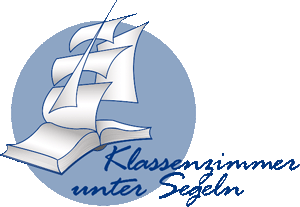By sharing a limited living space on board and responsibly participating in the ship’s operation, consideration and tolerance are demanded and fostered as well as the ability to handle conflicts, team spirit and taking on responsibility. The students are able to discover and improve various skills by means of practical tasks.
The ship’s operation includes tasks that are indispensable for everyday life on board as well as nautical training, which is required in order to navigate the vessel.
The ship as a living space
During the project the ship is the students‘ new home, in which the communal life needs to be organized and coordinated. The young people work and actively shape their life on board. Tasks include, among other duties, kitchen duty and cleaning the ship.
Kitchen duty
Kitchen duty refers to duties in the galley. Every day a group of students is responsible for providing food for everyone on board (approx. 45 persons) with the help of crew members. Thus the students learn all necessary steps to prepare meals.
Cleaning the ship
Cleanliness and hygiene are important health factors in a big community and on board a ship. All common areas and sanitary facilities are cleaned daily.
Other duties
Furthermore the students also participate in duties such as the disposal of rubbish, laundry, drink and food supply and administrative tasks as well as library and network administration.
Nautical training
Nautical training includes navigation, seamanship, meteorology, maritime law and marine communication. It primarily takes place during watch hours when the watch captain and the members of his watch are responsible for the ship, the course and safety on board. The students learn routine operations such as looking out for other ships or obstacles in the water and steering the helm. They familiarize themselves with sailing, both theoretically and practically, navigation, engine lubrication, fire control, weather observation and the basic duties of a sailor. Nautical training is adjusted to the knowledge of the students and the requirements of the sea area. Basic training takes place during the first weeks at sea. Following, skills and knowledge are consolidated and specialized.
Ship’s Handover
Handing over commission of the ship is an important didactic element in the conception of KUS. When the ship and the ship operation are handed over to the students, they hold all responsible positions such as captain, watch captain, watch captain assistant, boatswain, engineer and project management. The crew members take a back seat during this time and only intervene in the case of an emergency. The students learn to solve problems independently, to take on responsibility for their decisions and actions and experience their own skills and limitations.
During the project the ship is handed over to the students several times for varying periods of time.

